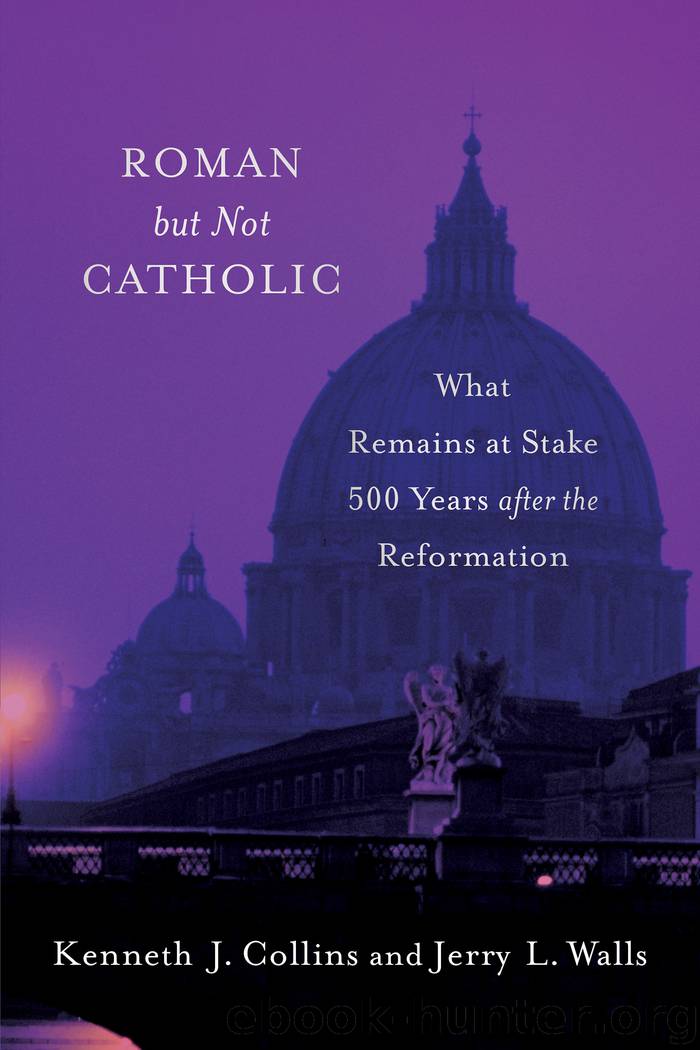Roman but Not Catholic by Jerry L. Walls

Author:Jerry L. Walls
Language: eng
Format: epub
Tags: Theology/Apologetics;Doctrinal Theology—History—Modern period (1500– );Protestant churches—Relations—Catholic Church;Catholic Church—Relations—Protestant churches;Reformed Church—Doctrines—History—Modern period (1500– );REL067000;REL067030
ISBN: 9781493411740
Publisher: Baker Publishing Group
Published: 2017-08-29T04:00:00+00:00
Matthew 16:19
The words of Jesus found in Matthew 16:19 (“I will give you the keys of the kingdom of heaven; whatever you bind on earth will be bound in heaven, and whatever you loose on earth will be loosed in heaven”) have been interpreted by the magisterium today in terms of the later hierarchy that eventually arose in the Roman Catholic Church. The Catechism, for example, states: “The office of binding and loosing which was given to Peter was also assigned to the college of apostles united to its head. This pastoral office of Peter and the other apostles belongs to the Church’s very foundation and is continued by the bishops under the primacy of the Pope.”69
Luther considered the power of the keys very extensively in his own writings and maintained that since the binding and loosing so described by Jesus entails excommunication, such an authority is one that is held not individually but communally.70 That is, it belongs not simply to one man in an idiosyncratic way (even if in concert with the bishops) but to the entire church, the people of God. In a similar fashion, Calvin acknowledged that “nothing is here given to Peter that was not common to him with his colleagues.”71 And Wesley, for his part in the eighteenth century, concluded in a slightly different way while still emphasizing the communal dimension of this power: the keys were not given to Peter alone but “to all the apostles at the same time.”72
The case made by the Protestant Reformers as well as by Wesley is strengthened, exegetically speaking, when due consideration is given to other passages of Scripture that help to illuminate Matthew 16:19. Take, for example, the process of excommunication laid out by Jesus a couple of chapters later, in Matthew 18:15–18, with its famous command to “tell it to the church” (v. 17). Such an authority therefore does not belong, once again, to any individual, certainly not in a self-referential way, but to the entire church. Or consider the postresurrection account found in John 20:19–23, a passage that in many respects parallels the language of Matthew 16:19: “And with that he [Jesus] breathed on them and said, ‘Receive the Holy Spirit. If you forgive anyone’s sins, their sins are forgiven; if you do not forgive them, they are not forgiven’” (vv. 22–23). Notice that in this context the referent for “you,” as in “you forgive,” is the Spirit-anointed assembly. Accordingly one interpretation that must be excluded for its lack of plausibility here in John and therefore elsewhere in its parallel in Matthew is that Jesus has an individual in mind when he speaks these words. The grammatical form of the verb in this verse is not the second-person singular but the second-person plural. So then it is a charismatic office that is being explored in this setting, one that is corporately held. Thus the people of God, animated by the Holy Spirit, hold the power of the keys. The divine presence and activity in the entire community must ever be in view.
Download
This site does not store any files on its server. We only index and link to content provided by other sites. Please contact the content providers to delete copyright contents if any and email us, we'll remove relevant links or contents immediately.
Under the Banner of Heaven: A Story of Violent Faith by Jon Krakauer(1410)
The Early Centuries - Byzantium 01 by John Julius Norwich(1357)
Taken by J. C. Owens(1277)
In Spirit and Truth (In Spiritu Et Veritate Series) by Reed Zoe(1260)
The Amish by Steven M. Nolt(1251)
Play It as It Lays by Joan Didion(1207)
The Apogee - Byzantium 02 by John Julius Norwich(1160)
The Last Man in Russia by Oliver Bullough(1096)
A History of the Amish by Steven M. Nolt(979)
Tears of the Silenced: A True Crime and an American Tragedy; Severe Child Abuse and Leaving the Amish by Misty Griffin(960)
Leaving the Witness by Amber Scorah(948)
Fallen by unknow(925)
David Sedaris Diaries by David Sedaris(911)
The Angel of Forest Hill by Cindy Woodsmall(898)
The Best of Amish Cooking by Phyllis Pellman Good(881)
The Ariana Trilogy by Rachel Ann Nunes(878)
Escape by Carolyn Jessop & Laura Palmer(875)
Deep Blue by unknow(868)
Primal: A Quest for the Lost Soul of Christianity by Mark Batterson(851)
